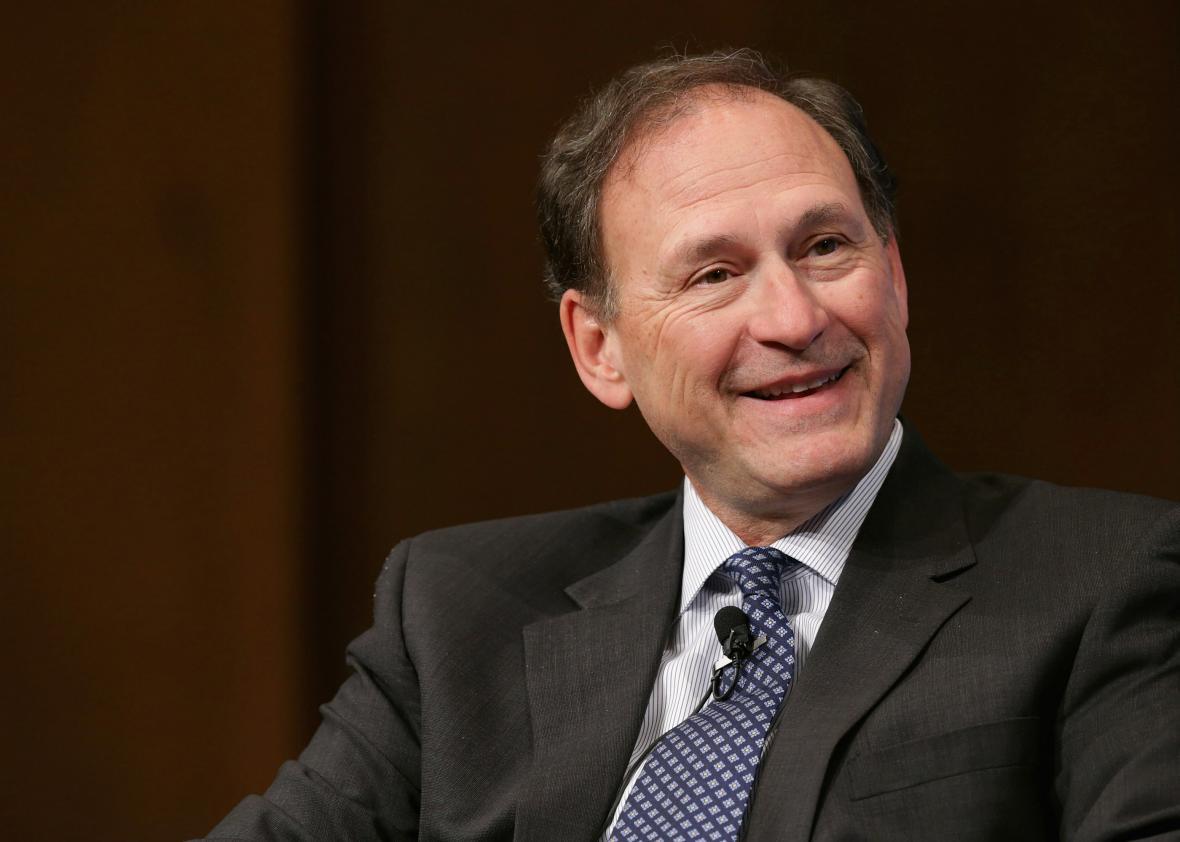Supreme Court Justice Samuel Alito delivered a fascinating keynote speech at the Claremont Institute’s 2017 annual dinner on Saturday night. Alito, who received a Statesmanship Award from the conservative think tank, devoted much of his address to criticizing his bêtes noires, including environmental regulation, affirmative action, the “media elite,” the European Union, and emergency contraceptives.
The candor with which Alito defends his beliefs—standing up for pharmacies’ rights to deny Plan B to women, for instance, or attacking senators who voted to limit corporate electioneering—is really quite refreshing. But there was one section of his address that was uncharacteristically confused and confusing. In it, Alito launched a critique of the executive agencies that implement many federal regulations. Alito expressed his frustration that today, when an agency “promulgates a regulation that purportedly interprets a statute enacted by Congress, the Supreme Court defers to that interpretation, unless it’s unreasonable.”
As a result, Alito warned darkly, there has “been a massive shift of lawmaking from the elected representatives of the people to unelected bureaucrats.” With this condemnation, Alito aligned himself with conservative judges like Donald Trump’s Supreme Court nominee Neil Gorsuch, who think agencies have been given too much power to legislate. Indeed, Alito has previously endorsed overruling past decisions that require courts to defer to an agency’s reasonable interpretation of an ambiguous regulation.
But then Alito went off the rails. He declared that he would provide two examples of this alleged regulatory overreach. The first was a fair illustration of his point, involving water regulation by the Environmental Protection Agency. The second was Massachusetts v. EPA. In that case, the Supreme Court found that carbon dioxide is a “pollutant” within the scope of the Clean Air Act, allowing the EPA to regulate it. Alito dissented from the 5–4 decision. And in his speech on Saturday, he summarized his frustration with the majority opinion:
Now, what is a pollutant? A pollutant is a subject that is harmful to human beings or to animals or to plants. Carbon dioxide is not a pollutant. Carbon dioxide is not harmful to ordinary things, to human beings, or to animals, or to plants. It’s actually needed for plant growth. All of us are exhaling carbon dioxide right now. So, if it’s a pollutant, we’re all polluting. When Congress authorized the regulation of pollutants, what it had in mind were substances like sulfur dioxide, or particulate matter—basically, soot or smoke in the air. Congress was not thinking about carbon dioxide or other greenhouse gases.
Alito’s comments here are straight out of the climate change denialist playbook—and were rejected in Massachusetts v. EPA, for good reason. The Clean Air Act defines “air pollutant” as “any air pollution agent or combination of such agents, including any physical [or] chemical … substance or matter which is emitted into or otherwise enters the ambient air” and “may reasonably be anticipated to endanger public health or welfare.” In its decision, the Supreme Court correctly recognized that carbon is a “chemical substance or matter” that is “emitted into” the air and “endanger[s] public health” by contributing to rising global temperatures. There is no textual support for Alito’s assertion that the law was meant to be limited to “soot or smoke.”
But what’s really odd about Alito’s comments on Saturday is that he seems to have forgotten key details of the case. Massachusetts v. EPA was not, contra Alito’s intimation, an example of “a massive shift of lawmaking from the elected representatives of the people to unelected bureaucrats.” To the contrary: The case marked a departure from the usual deference that courts afford administrative agencies. Instead, it constituted a triumph of an independent judiciary. What Alito forgot to mention in his speech was that, at the time, the EPA refused to regulate carbon. Massachusetts, already suffering from the effects of climate change, sued the EPA, demanding that it enforce the Clean Air Act. Those “unelected bureaucrats” at the EPA were refusing to enforce a law passed by the people’s “elected representatives.” And the judiciary stepped in to ensure that the bureaucrats followed the law.
All of this raises an important question: What does Alito actually want? Does he want the court to insist that agencies follow the clear congressional command of a duly enacted statute, as it did in Massachusetts v. EPA? Or does he want the courts to defer to agencies and their horrible “unelected bureaucrats”—as he voted to do in Massachusetts v. EPA? Alito can’t have it both ways. And embedded in his fulmination against climate science is a legitimately confused and contradictory legal stance that suggests that, for Alito, the only valid regulations are the ones he agrees with.
